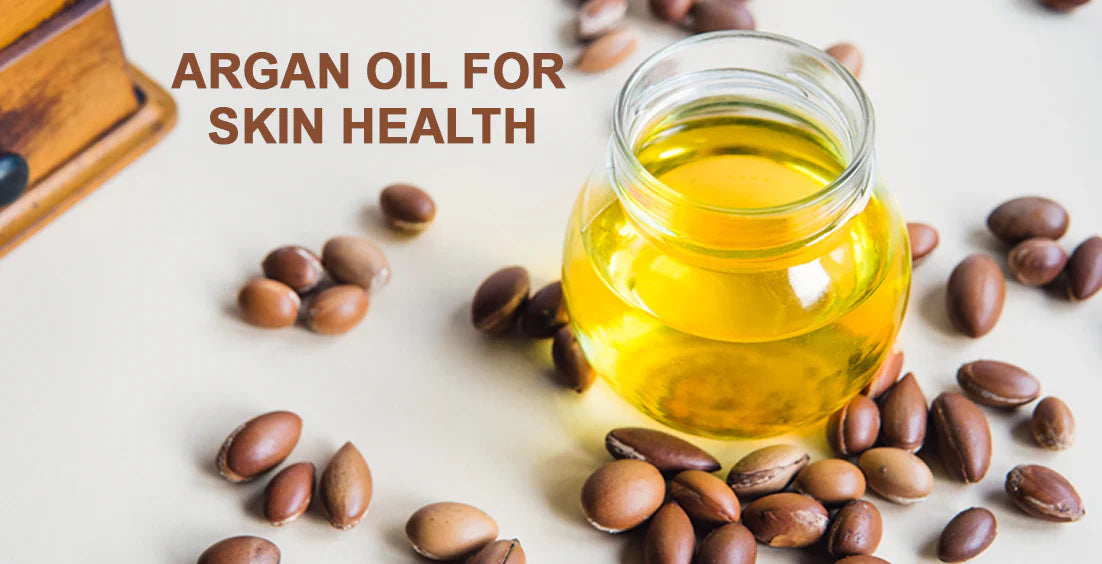10 Potent Benefits of Argan Oil For Skin Health
Argan oil has many potential benefits for the skin. Learn more about the benefits, risks, and how you can use it as part of a skincare routine.

Often described as ‘liquid gold,’ argan oil is derived from the kernels of the Argania spinosa tree native to Morocco. Rich in vitamins A, E, and C, omega-6 fatty acids, and other potent antioxidants, nutrients, and anti-inflammatory agents, argan oil may have potential health benefits like lowering cholesterol, easing arthritis pain, and supporting immune health.
This rich elixir also has enriching properties for hair and skin health. It is included as an ingredient in numerous supplements and cosmetic products, and the best argan oil for the skin comes in pure form to be applied directly to the complexion.
Suitable for all skin types, many regard this powerful oil as the ultimate ingredient in their daily regimen and praise the benefits of argan oil for skin on multiple levels. In this article, we explore 10 of its most potent properties for the complexion.
Key Takeaways
- Moroccan argan oil for skin is rich in fatty acids, antioxidants like vitamins A, C, and E, and anti-inflammatory agents that offer multiple potential benefits to the complexion.
- Argan oil for skin benefits may include protecting from harmful UV rays, reducing signs of aging like wrinkles, dark circles, and hyperpigmentation, moisturizing, fading stretch marks, and healing wounds, acne, skin conditions, and infections.
- For best results, apply a few drops to your face in the morning and evening as part of your regular skincare routine.
- People with an allergy to tree nuts may sometimes experience a skin reaction to argan oil and should perform a patch test before full application.
10 Benefits of Argan Oil for Skin
If you’re looking for the ultimate ingredient to include in your daily routine, argan oil offers a wide range of advantages and should not be overlooked. These are the top 10 powerful argan oil for skin benefits:
1. Hydrating the Complexion
Argan oil for skin is perhaps best known for its hydrating benefits, rich in fat-soluble vitamin E and fatty acids that help support the moisture barrier. It helps eliminate dryness on the complexion and scalp, deeply moisturizing the skin and helping to enhance hair health and growth.
Marisa Garshick, MD
Board-certified dermatologist Marisa Garshick, MD notes:
In general, argan oil can be used by all skin types as those with dry skin will benefit from its moisturizing properties, while those with oily skin may also find it tolerable as it is lightweight and won’t leave the skin feeling greasy.
RELATED - Amazing Benefits of Argan Oil for Hair
2. Protecting From Sun Damage
Whether applied topically or in supplement form, argan oil includes potent antioxidant properties that destroy free radicals, lowering oxidative stress to repair the skin barrier and offer additional protection from UV rays. This may protect from premature aging like wrinkles, fine lines, and dark spots, and help decrease the risk of developing melanoma.
3. Reducing Signs of Aging
Among the many cosmetic uses of argan oil, this ingredient has powerful antioxidants that repair skin barrier damage to help decrease signs of aging. It may also boost collagen levels, helping to higher the skin, improve elasticity, and decrease the depth of wrinkles and fine lines on the complexion.
4. Diminishing Under-Eye Concerns
Argan oil also helps reduce fine lines and crow’s feet under the eyes, and its anti-inflammatory properties may decrease the appearance of bags and puffiness. In addition, there’s some indication that the essential fatty acids in this rich oil could improve microcirculation under the eyes to help fade dark circles.
5. Fading Hyperpigmentation
Can you use argan oil for skin lightening? This potent ingredient contains vitamin C, which slows the production of melanin to help fade areas of hyperpigmentation and even out skin tone. Using argan oil for skin whitening does not offer immediate results, and may be a gradual process that requires consistent application over time.
6. Controlling Oil Production
Evidence indicates that consistent application of argan oil twice daily to the face may slow sebum production in the skin, potentially making it ideal for people with greasy skin. A 4-week study in the Journal of Cosmetic Dermatology concluded that regular application of an argan-oil-enriched cream reduced sebum levels by 20% and oil areas of skin by 42%.
7. Treating Acne
The fact that argan oil slows oil production means it may offer acne prevention benefits, balancing sebum production to help prevent breakouts. It also has exfoliating properties that help unclog the pores of dirt, oil, and makeup.
In addition, argan oil contains fatty acids like oleic and linoleic with anti-inflammatory agents that soothe the complexion and ease redness and swelling to treat existing acne.
8. Healing Skin Conditions and Infections
Pure argan oil for the skin has potent anti-inflammatory agents that may speed up the healing of skin conditions like eczema, psoriasis, and atopic dermatitis and ease symptoms like scaling, itchiness, redness, and dryness.
Dermatologist Shilpi Khetarpal, MD, explains:
It can be used to help dry, sensitive skin for those looking for more natural remedies.
In addition to its healing and soothing anti-inflammatory agents, organic argan oil for the skin has anti-bacterial and anti-fungal properties that kill harmful bacteria and microbes on the complexion with regular twice-daily application, helping to heal skin infections.
9. Speeding Up Wound Healing
Due to its potent antioxidants like vitamin E and its collagen-boosting properties, the benefits of argan oil also include helping to mend wounds and cuts more quickly. A study published in Wound Management and Prevention concluded that 14 days of application helped effectively heal second-degree burns in rats.
10. Diminishing Stretch Marks
High in collagen-boosting vitamin E and skin-barrier-repairing antioxidants, regular application of argan oil may tighten sagging skin and improve elasticity. It also balances and evens out skin tone, making stretch marks less visible.
One of the best potential uses of argan oil for the skin is to help smooth stretch marks on the skin due to pregnancy or weight loss.
How to Use Argan Oil For Skin
Argan oil is included in some natural supplements for skin care, often with other extracts and oils that may bolster skin health, brightness, and youthfulness. In addition, you can find it as an ingredient in creams, gels, or serums, but the best argan oil for the skin is in pure form in many cases.
While it has hydrating properties, this ingredient is not a replacement for your regular moisturizer. As an occlusive oil, it helps strengthen the moisture barrier to keep the liquid locked inside, but you still need an additional product to heighten hydration.
You may be asking yourself, “Can I use argan oil on my face every day?” In most cases, you can and should apply it twice daily for optimal benefits. The best way to apply argan to the skin is in the morning and evening as part of your regular skincare regimen, after cleansing and toning, and before adding your moisturizer.
Take a few drops onto your fingers and apply it to lightly damp skin, gently massaging it into the target areas. For additional benefits, individuals with a typically greasy complexion may want to leave argan oil on their face overnight to help balance sebum levels.
Potential Side Effects and Precautions
While generally safe and well-tolerated with other skincare products, individuals with an allergy to tree nuts or very sensitive skin may sometimes experience argan oil for face side effects such as rash, itchiness, or contact dermatitis with its application.
In addition, those with inflammatory skin conditions like seborrheic dermatitis should approach this ingredient cautiously, as it could worsen the condition. If you are using a skincare formulation with argan oil and other ingredients, it’s important to check the label carefully to avoid other potential allergies or reactions.
It’s always a good idea to conduct a patch test before the regular use of a new product by applying some to a small area of skin. If there is no reaction within 24 hours, argan oil is most likely safe for you to use. If you have concerns, consult with a dermatologist before use.
Dietary supplements that include argan oil may have other ingredients with potential side effects like stomach upset, nausea, or a decrease in appetite. Before taking a new supplement, consult with a healthcare practitioner, especially if you have a health condition or take medication.
Conclusion
Argan oil is a nutrient-rich, multifaceted ingredient that offers numerous benefits for skin health, as it has deeply hydrating, antioxidant, anti-microbial, and anti-inflammatory properties.
With consistent application, it helps decrease signs of aging like wrinkles, lines, dark circles, and dark spots, balance skin tone, heal infections and conditions like acne and eczema, and protect the complexion from UV rays.
If suitable for your skin, consider including topical argan oil in your regular daily skincare routine or a product that incorporates it for a brighter, healthier, more youthful complexion.
About WOWMD Staff
The WOWMD Staff category features a diverse team of writers, each bringing specialized knowledge in areas such as nutrition, fitness, wellness, and more. Articles in this category benefit from insights provided by multiple experts. All content is peer-reviewed and regularly updated to ensure compliance with our editorial standards.
References
- Everything You Need to Know About Argan Oil For the Skin: https://www.byrdie.com/argan-oil-for-skin-5080152
- Activation of MITF by Argan Oil Leads to the Inhibition of the Tyrosinase and Dopachrome Tautomerase Expressions in B16 Murine Melanoma Cells: https://pmc.ncbi.nlm.nih.gov/articles/PMC3723062/
- The Effect of Dietary and/or Cosmetic Argan Oil on Postmenopausal Skin Elasticity: https://pmc.ncbi.nlm.nih.gov/articles/PMC4321565/
- https://www.researchgate.net/publication/6308992_Clinical_and_Instrumental_Study_of_Efficacy_of_a_New_Sebum_Control_Cream
- 5 Skin and Hair Benefits of Argan Oil: https://health.clevelandclinic.org/argan-oil-benefits
- The Effects of Argan Oil in Second-degree Burn Wound Healing in Rats: https://www.hmpgloballearningnetwork.com/site/wmp/article/effects-argan-oil-second-degree-burn-wound-healing-rats
Evidence Based Research
This WOWMD content has been reviewed, as well as checked for facts, so as to guarantee the best possible accuracy.
We follow a strict editorial policy, especially related to the sources we use. Our articles are resourced from reputable online pages, with research drawn from academic institutions and peer-reviewed studies. You can click on the numbers in the parentheses (1, 2, etc.) and check out those references.
The feedback form on this page can be used to report content that is not accurate, up-to-date or questionable in any manner.
We do NOT intend for the information presented through our articles to replace the medical relationship with a qualified physician, nor does it represent specialized advice.


 Skin Detoxification Bundle
Skin Detoxification Bundle Complete Weight Loss Bundle
Complete Weight Loss Bundle Heart Care Bundle
Heart Care Bundle Better Immunity Bundle
Better Immunity Bundle  Men's Immunity & Prostate Health Bundle
Men's Immunity & Prostate Health Bundle Stress + Energy + Wellness Combo
Stress + Energy + Wellness Combo  Energy Booster Combo
Energy Booster Combo Natural Skin Care Bundle
Natural Skin Care Bundle Workout Supplements Combo
Workout Supplements Combo Cognitive Health & Vision Combo
Cognitive Health & Vision Combo Joint Health Support Combo
Joint Health Support Combo

















 By WOWMD Staff
By WOWMD Staff
